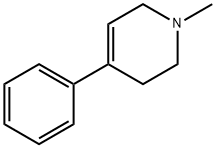
1,2,3,6-Tetrahydro-1-methyl-4-phenylpyridin
Bezeichnung:1,2,3,6-Tetrahydro-1-methyl-4-phenylpyridin
CAS-Nr28289-54-5
Englisch Name:1-METHYL-4-PHENYL-1,2,3,6-TETRAHYDROPYRIDINE
CBNumberCB8254906
SummenformelC12H15N
Molgewicht173.25
MOL-Datei28289-54-5.mol
Synonyma
1,2,3,6-Tetrahydro-1-methyl-4-phenylpyridin
1,2,3,6-Tetrahydro-1-methyl-4-phenylpyridin physikalisch-chemischer Eigenschaften
| Schmelzpunkt | aprox. 36°C |
| Siedepunkt | 128-132 °C12 mm Hg(lit.) |
| Dichte | 1.001±0.06 g/cm3(Predicted) |
| storage temp. | Inert atmosphere,Room Temperature |
| Löslichkeit | Chloroform (Slightly), Dichloromethane (Slightly), Ethyl Acetate (Slightly) |
| Aggregatzustand | Solid |
| pka | 8.66±0.40(Predicted) |
| Farbe | Pale Yellow to Light Yellow |
| Merck | 13,6319 |
| Stabilität | Stable. Incompatible with strong oxidizing agents. |
| Kennzeichnung gefährlicher | T |
| R-Sätze: | 25-39/23/24/25 |
| S-Sätze: | 45 |
| RIDADR | UN 2811 6.1/PG 2 |
| WGK Germany | 3 |
| RTECS-Nr. | UT8358900 |
| HazardClass | 6.1(b) |
| PackingGroup | III |
| Giftige Stoffe Daten | 28289-54-5(Hazardous Substances Data) |
| Toxizität | Human toxicity originally discovered when it was an unexpected by-product from the illicit synthesis of a heroin substitute (i.e., meperidine analog). Currently used experimentally as the primary animal model for the study of Parkinson’s disease. MPTP is a neurotoxicant that is activated to 1-methyl-4-phenylpyridinium ion (MPP1) by the actions of monoamine oxidase B located in the mitochondria of brain astrocytes. The MPP1 is then transported into dopamine, and to a lesser extent, other monoaminergic neurons. Once inside these dopamine neurons in the substantia nigra, it destroys these neurons by mechanisms that may involve an oxidative cascade and/or inhibition of electron transport. Intoxication causes a parkinsonism syndrome almost identical in signs and symptoms to Parkinson’s disease, including rigidity, bradykinesia, tremor, and postural instability. In the event of known ingestion, immediate (but not delayed) administration of a monoamine oxidase inhibitor (especially one selective for MAO-B like deprenyl) and dopamine uptake inhibitor can be therapeutic. |


